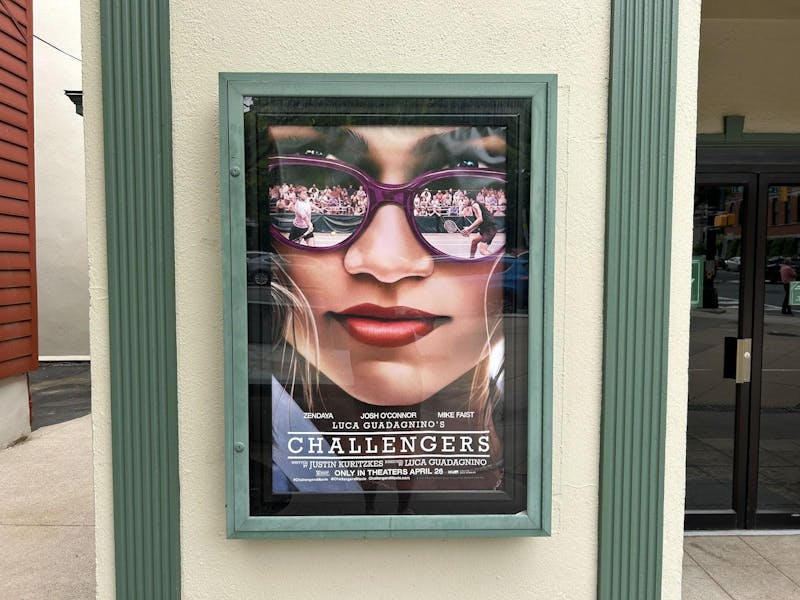“Challengers” has become a modern cultural phenomenon. The film stars Zendaya, Josh O’Connor, and Mike Faist as young adult tennis players who become caught up in a messy and contentious love triangle. While their tennis careers when they were young adults caused the trio to diverge early in life, a Challenger tennis tournament reunites them years later, threatening disorder between the three athletes. Viewings of the film are not sponsored by the USG Movies Committee; nevertheless, it has gained popularity among Princeton students.
The film mostly lives up to its high expectations. Director Luca Guadagnino has risen as one of the most interesting film directors of his generation due to his ability to craft innovative, character-driven stories. He knows how to encourage his actors to deliver powerful performances, as well as uses cinematography and score to curate unique atmospheres. These skills are best exhibited in Guadagnino’s 2017 film “Call Me By Your Name,” which was nominated for the Academy Award for Best Picture. Similar to “Challengers,” that film situated a complex romance within the context of a challenging world — namely the cultural uniformity of 1980s Italy. He brings his knack for examining such complexities to “Challengers.”
Zendaya, Josh O’Connor, and Mike Faist all deliver passionate performances as three young, driven athletes with lives that are frustratingly intertwined. Zendaya’s character, Tashi, is endlessly competitive and driven, but also complicated, manipulating her love interests at times. O’Connor and Faist portray Art and Patrick, respectively. Both characters are constantly drawn towards Tashi, competing for her favor throughout their individual lives. Each member of the love triangle portrays their roles with such realism and subtlety that they truly portray professional athletes who have fatefully fallen in love. Their acting competency is key to the film’s tense yet romantic atmosphere.
Another one of “Challengers’” strengths is its editing; the film uses it to masterful effect, keeping the narrative intriguing and surprising across its over-two-hour-long runtime. Guadagnino weaves his characters’ old and young lives together, using a non-linear narrative that constantly comes back to a challenger tennis match happening in the modern day. Details and developments are revealed in such a way that allows the viewer to view each characters’ modern-day actions in a completely new light.
The cinematography and score curated by Guadagnino also give the film an aesthetic edge that persistently drives its suspense. A low ranking tennis match has never felt more consequential; the camera follows the players from all different angles as they serve, hit forehands and backhands, and drain aces. At one point, the viewer watches the match from the perspective of the tennis ball, flying violently back and forth. These scenes are also bolstered by a techno-inspired score. The score is the film’s pulsating heartbeat — it makes the tennis match endlessly entertaining. I was truly on the edge of my seat by the conclusion.
Still, the film’s screenplay can at times mute the nuances of their performances. The three leads are challenged to play two different stages of life for their characters: one stage in their young adult years and the other almost a decade later. At times, the screenplay tries too hard to make the characters seem older during their adult-age scenes, possibly due to the actors’ widely-known statuses as Gen-Z icons. Zendaya, in particular, is given an excessive amount of swear words and outbursts in her scenes as a mature adult, which sometimes make her line delivery awkward. Luckily, the leads’ acting abilities are strong enough to overcome these flaws.
What truly keeps “Challengers” from being an absolute ace, however, is the handling of its message. The film wants to explore athletes and their sports as an intimate relationship, where a person and their passion morph into more of a symbiotic romance. However, the conclusion sacrifices logical character development in pursuit of this message, leaving the characters’ fates feeling unjustified. The film also seems to want to make a statement about race and class, but ultimately fails to do so. Tashi comes from a lower socioeconomic status than both Art and Patrick and later becomes caught up in the men’s careers at the sacrifice of her own. Despite this interesting power dynamic, the film is afraid to address it beyond a few throwaway lines.
Regardless, “Challengers” is largely successful in its exploration of seduction and desire, both on the tennis court and off. The film provides a truly unique take to tennis which makes it a worthwhile watch, even if its screenplay and message ultimately withhold it from reaching its full potential as an ace of an achievement.
Edward Rogers is a contributing writer for The Prospect at the ‘Prince’ from Durham, N.C. He can be reached at edward.rogers[at]princeton.edu.
Do a double take with this tasty crossword by Senior Constructor Shana Ann Chen.
Do a double take with this tasty crossword by Senior Constructor Shana Ann Chen.
“As Asian American students, we must continue to build our legacy of political activism in America.”
“As Asian American students, we must continue to build our legacy of political activism in America.”
Director of Princeton’s Program in Theater & Music Theater Jane Cox and writer Branden Jacobs-Jenkins ’06 won Tonys at the ceremony on Sunday for their work on “Appropriate.”
Director of Princeton’s Program in Theater & Music Theater Jane Cox and writer Jacobs-Jenkins won Tonys at the ceremony on Sunday for their work on “Appropriate.”
